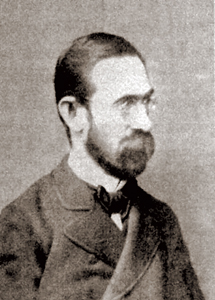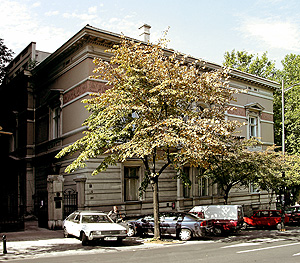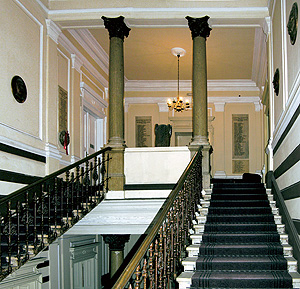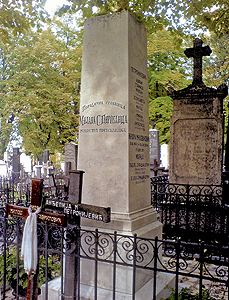Forgotten Ones
MILAN PIROĆANAC (1837–1897), LAWYER AND POLITICIAN, ONE OF THE MOST SIGNIFICANT SERBIAN INTELLECTUALS IN THE SECOND HALF OF THE XIX CENTURY
Challenges of Modern Conservatism
He came into this world as a Nedeljković, but changed his surname during his studies. He studied law in Belgrade, Paris, Heidelberg. He was the main ideologist of the young conservatives gathered around the ”Videlo” magazine, the founder and leader of the Serbian Progressive Party, minister of foreign affairs, government premier. He was brilliant in representing Queen Natalija in the divorce proceeding and brought the king to a dead end. The seat of the Serbian Writers’ Association has been in his house in Belgrade, in Francuska Street 7 for decades
By: Vladimir Andjelković
 He was born in Jagodina in 1837. His father Stevan Nedeljković, originating from Pirot, was a remarkable member of the First and Second Serbian Uprising and the county chief in Knjaževac. His mother Milica, from the Jagodina County, was first married to Duke Pavle Cukić. With such roots, Milan Piroćanac made one of the most successful careers in the state service of the Kingdom of Serbia. He finished elementary school in Jagodina, attended the gymnasium in Kragujevac and Belgrade, and studied law at the Belgrade Lyceum (1854-1856). He continued his academic studies in Paris in 1856, where he graduated in 1860. He spent the following year in Heidelberg. He was born in Jagodina in 1837. His father Stevan Nedeljković, originating from Pirot, was a remarkable member of the First and Second Serbian Uprising and the county chief in Knjaževac. His mother Milica, from the Jagodina County, was first married to Duke Pavle Cukić. With such roots, Milan Piroćanac made one of the most successful careers in the state service of the Kingdom of Serbia. He finished elementary school in Jagodina, attended the gymnasium in Kragujevac and Belgrade, and studied law at the Belgrade Lyceum (1854-1856). He continued his academic studies in Paris in 1856, where he graduated in 1860. He spent the following year in Heidelberg.
Upon the persuasions of Ilija Garašanin, he got employed at the Ministry of Foreign Affairs where, due to his personal qualities, he soon became chief. He was the president of the Rudnik County Court for a while, and since 1872, when he became an attorney, he was, according to common opinion, one of the best Serbian lawyers. He became Minister of Foreign Affairs on November 20, 1874, in Jovan Marinović’s government.
After the fall of Jovan Ristić’s liberal government on October 21, 1880, he established one of the most successful Serbian governments in the second half of the XIX century. He was the premier, Čedomilj Mijatović was Minister of Foreign Affairs, Milutin Garašanin (the second man of the party and the best orator among the Progressionists) was Minister of Internal Affairs, while the Ministry of Education was given to Stojan Novaković, who afterwards became the third president in the history of the Progressive Party…
This government, consisting of young conservatives gathered around the Videlo (Light) magazine, was discreetly supported by the Radicals in the Parliament. Although young, all of them being forty-year-olds, these new conservatives were already well known as talented and educated people from good Serbian houses. In only three years, during the perhaps most reformistic Serbian government in the XIX century, a wide modernization program was conducted and a set of laws brought which would radically change the Serbian society (law on press and gatherings, law on judges, law on education, laws on the army and National Bank, a set of laws which founded the new tax system).
During Piroćanac’s mandate, the famous secret convention with Austria was concluded and a relatively favorable commercial agreement was signed with this powerful state, Serbia became a Kingdom, the construction of the railway through Serbia began…
All these reforms were still not sufficient for the Progressive Party to earn the trust of the people. At the first elections that followed, forced by the Radicals and held on September 7, 1883, the ruling Party suffered a loss. Piroćanac’s government resigned on September 21. King Milan did not give the authority to the Radicals who won the elections, but used a crafty maneuver and placed a sharp politician Nikola Hristić as premier. He was supposed to enforce the new law on standing army, which led to the Timok Uprising and the fall of the radical movement. After the situation in Serbia calmed down, already in February 1884 the king gave the mandate to Milutin Garašanin, second leader of the Progressive Party.
ABOVE VULGAR DEMAGOGY
 Piroćanac was a democrat and conservative by conviction, supporter of strict legalism and sharp opponent of demagogy that spread in the Parliament. Among all the young conservatives which would form the Progressive Party and rule Serbia in the 1870s, he was most powerful because of his extraordinary knowledge of law. He founded the magazine Šumadija. ”He contemplated on politics very logically” and continuously criticized the liberal Ristić. Tall, with long legs, he resembled, as Jovanović described him, a giraffe with a skinny head of a remarkable professor. He was ”incredibly vain” and ”moody like a woman”, but also, as Dvorniković emphasizes, sharp as a saber, impetuous and irreconcilable as an opponent. It was a bad feature for a statesman, but wonderful for the role of an attorney. Milan Piroćanac demonstrated this in court, provoking enthusiasm of the audience, while representing Queen Natalija in the divorce from King Milan court proceeding. Piroćanac was a democrat and conservative by conviction, supporter of strict legalism and sharp opponent of demagogy that spread in the Parliament. Among all the young conservatives which would form the Progressive Party and rule Serbia in the 1870s, he was most powerful because of his extraordinary knowledge of law. He founded the magazine Šumadija. ”He contemplated on politics very logically” and continuously criticized the liberal Ristić. Tall, with long legs, he resembled, as Jovanović described him, a giraffe with a skinny head of a remarkable professor. He was ”incredibly vain” and ”moody like a woman”, but also, as Dvorniković emphasizes, sharp as a saber, impetuous and irreconcilable as an opponent. It was a bad feature for a statesman, but wonderful for the role of an attorney. Milan Piroćanac demonstrated this in court, provoking enthusiasm of the audience, while representing Queen Natalija in the divorce from King Milan court proceeding.
Along with all this, he was ”the purest type of intellectual of the Obrenović era: educated, a democrat, with liberal and conservative opinions, unbribable in principal things, openly opposing the autocratism of King Milan, but also an elitist in criticizing the primitivism around him. Most contemporaries considered Piroćanac a brilliant philosopher, but (as Slobodan Jovanović thought) an unsuccessful statesman, since he ”parted with both King Milan and the people who, in the moment when the reforms of the society reached their culmination, turned to the Radicals”.
Historians today consider Piroćanac one of the better premiers of the Serbian government in the XIX century. Along with all this, he was also the charismatic leader of the Serbian Progressive Party from 1880 to 1886 and its first ideologist, who craftily sailed between ”emphasized liberalism and moderate conservatism”.
He retired from politics when his suggestion to create a Progressive-Liberal coalition and thereby overthrow the government of his Party colleague and second president of the Party Milutin Garašanin did not pass at the Party’s Main Board. He wrote several books on historiography, the most valuable being Prince Mihailo and the Joint Acts of the Balkan Nations (1895), The Balkan Peninsula (1889) and the voluminous study International Position of Serbia (1892). Regarding the latter, Slobodan Jovanović wrote that Piroćanac’s ”discussion is cold, sharp-minded and not very realistic”, that it completely reveals a man who is ”so immersed into the logics of his reasoning, that it seems impossible for him that historical events could develop any differently than in the direction he contemplated. All the features Piroćanac expresses in his discussion could be very valuable, but not in the field of practical politics”.
Piroćanac also wrote three historically interesting polemics pamphlets against the liberal Jovan Ristić, which are difficult to understand today due to the changed context.
CHAIN OF TRAPS FOR THE KING
 Outside of politics, Piroćanac experienced his moments of glory as an attorney of Queen Natalija, whom he brilliantly represented in the divorce procedure with King Milan. Since Natalija began ”refusing giving the pleasures of marriage” to King Milan after finding out her husband is cheating on her, Milan decided to divorce the beautiful Queen and marry, as some historians claim, a common and not very pretty civilian Artemiza Hristić. So began serious family arguments. However, the culmination of the conflict between the royal spouses took place, as Avram Petrović writes in his wonderful memoirs, in the luxurious summer villa in Biarritz, at the French Atlantic coast, and immediately afterwards in Wiesbaden, Germany. General Kosta Protić then attempted to forcefully, with the help of Bismarck’s police, abduct Milan’s and Natalija’s young son Aleksandar and bring him to Belgrade, at the same time informing the Queen that she is never to return to Serbia again. Outside of politics, Piroćanac experienced his moments of glory as an attorney of Queen Natalija, whom he brilliantly represented in the divorce procedure with King Milan. Since Natalija began ”refusing giving the pleasures of marriage” to King Milan after finding out her husband is cheating on her, Milan decided to divorce the beautiful Queen and marry, as some historians claim, a common and not very pretty civilian Artemiza Hristić. So began serious family arguments. However, the culmination of the conflict between the royal spouses took place, as Avram Petrović writes in his wonderful memoirs, in the luxurious summer villa in Biarritz, at the French Atlantic coast, and immediately afterwards in Wiesbaden, Germany. General Kosta Protić then attempted to forcefully, with the help of Bismarck’s police, abduct Milan’s and Natalija’s young son Aleksandar and bring him to Belgrade, at the same time informing the Queen that she is never to return to Serbia again.
After this incident, King Milan began making plans how to divorce Queen Natalija (divorces of royal marriages at the time were pretty complicated). Therefore, King Milan decided, a bit incautious and certainly in a hurry, to file a divorce request to the Consistory, the spiritual church court which had jurisdiction for this kind of divorce proceedings.
Then Milan Piroćanac appeared as Natalija’s attorney. Angry with Milan because the inconsiderate king tricked him several times (as Slobodan Jovanović claims), Piroćanac played brilliantly in his legal field, where he was an incomparable ruler. He created tactics with which he would pull the king into a real labyrinth of formal divorce catches and make him withdraw from the divorce, allowing Natalija, whom the people liked very much for her pro-Russian and great-Serbian orientation, to return to Serbia.
 Seeing that he was entangled in all the legal traps set by Piroćanac, Milan asked, with a weak excuse, to pause the proceeding for three months. The Serbian and the European public followed this proceeding with unhidden pleasure and heartily supported Queen Natalija. Chronicle writers claim that King Milan used to go around Belgrade saying that ”because of priests and monks” he cannot get a divorce and ”drive away a woman he hates”. At the end, already desperate, the King had to take ”an irregular path” and, with the help of the Minister of Education, pressured Metropolitan Teodosije , ”a weak and feeble old man originating from over the river Drina”. Having no way out, the Metropolitan put an end to this marriage with his blessing, based on the canon statement that ”everything tied on earth is also tied in heavens”, from which he derived that ”everything untied on earth is also untied in heavens”. Seeing that he was entangled in all the legal traps set by Piroćanac, Milan asked, with a weak excuse, to pause the proceeding for three months. The Serbian and the European public followed this proceeding with unhidden pleasure and heartily supported Queen Natalija. Chronicle writers claim that King Milan used to go around Belgrade saying that ”because of priests and monks” he cannot get a divorce and ”drive away a woman he hates”. At the end, already desperate, the King had to take ”an irregular path” and, with the help of the Minister of Education, pressured Metropolitan Teodosije , ”a weak and feeble old man originating from over the river Drina”. Having no way out, the Metropolitan put an end to this marriage with his blessing, based on the canon statement that ”everything tied on earth is also tied in heavens”, from which he derived that ”everything untied on earth is also untied in heavens”.
The following day, all newspapers announced that the marriage between King Milan and Queen Natalija is divorced. However, it was not the end of this, from the legal point of view interesting proceeding. The decision of the Metropolitan was soon canceled, and the marriage was proclaimed not divorced. During the following years, the idle Serbian citizens continued having fun with the legal manipulations of the prominent attorney Milan Piroćanac.
The Serbian public also spoke about Milan Piroćanac several times afterwards.
After the failure in the war against Bulgaria, Milutin Garašanin resigned from his position on March 31, 1887, ingloriously ending his second mandate and the rule of the Progressive Party. Liberals and moderate radicals began ruling the country. Their celebration of victory soon turned into a reckoning with political opponents which continued until 1889, with different intensity. It began with throwing stones at the house of Milan Piroćanac in Francuska Street 7.
Milan Piroćanac was also related to the great affair after it was discovered that King Milan and the ministers of the Progressive Party were bribed at the time of concluding the agreement on constructing a railway through Serbia.
Abandoned by all his Party colleagues and forgotten, Milan Piroćanac died in Belgrade in 1897. He was buried in the large family tomb at the New Cemetary.
***
House
The family one-floor house of Milan (Nedeljković) Piroćanac in Francuska Street 7 in Belgrade, where the seat of the Serbian Writer’s Association is today, was probably designed by architect Jovan Ilkić, according to the composition of basic volumes, the details and manner of elaboration.
In the second half of the XX century, as a home of Serbian writers, this edifice became a symbol of free-mindedness, intellectual courage, great ideas and battle against both planetary totalitarianisms – the Eastern and the Western.
***
Bartholomew’s Nights
The second government of Milutin Garašanin resigned on March 31, 1887, after the defeat in the war against Bulgaria, thereby ending the era of the Progressive Party rule. Severe political reckonings followed, starting with throwing stones at the house of Milan Piroćanac in Belgrade, in Francuska Street 7. In the explosion of the long accumulated rage and in a true chaos, 377 members of the Progressive Party were killed, 50 houses were completely burnt, whole villages were displaced and more than 60 prominent politicians, among whom also were the leaders of the Party Čedomilj Mijatović and Milutin Garašanin, were forced to move out of the country and go to voluntary exile!
All these brutal crimes were noted in the Progressive Party’s magazine Videlo, and Milan Piroćanac described in his diary the most drastic incidents in detail.
***
Affair
It was truly a great corruption affair, involving King Milan Obrenović himself, the ministers of the Progressive Party, and also Milan Piroćanac. It was discovered that there had been bribing during concluding the agreement on constructing a railway through Serbia. For ten years, until the railway was completely paid, the Radicals continued discussions at the Parliament sessions about the corruption. Even Laza Kostić, in the humorous liberal newspaper Brka (Man with Moustache), wrote allegories about Judah selling Christ too cheaply, which the public at the time understood as a clear allusion to the corruption of the top officials.
|
